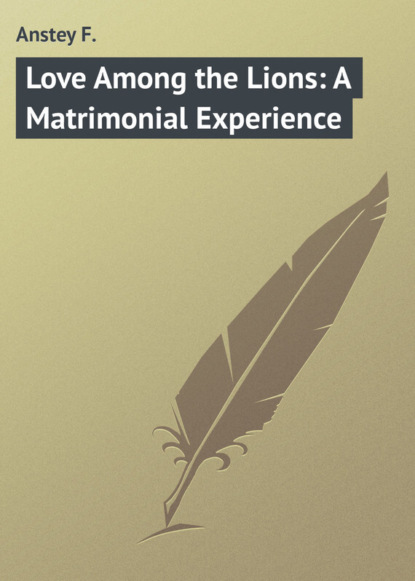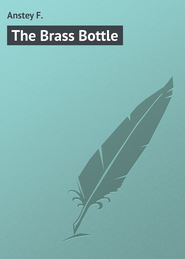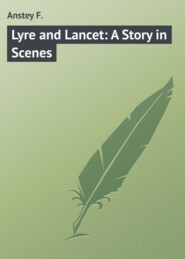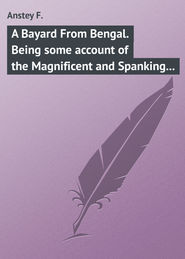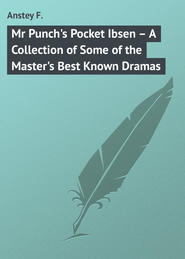По всем вопросам обращайтесь на: info@litportal.ru
(©) 2003-2024.
✖
Love Among the Lions: A Matrimonial Experience
Настройки чтения
Размер шрифта
Высота строк
Поля
"What's the use of trying to make ourselves what we are not?" I broke out. "If Fate has made us wooden ninepins in the world's nursery, we may batter our head against the walls as much as we like – but we can never batter it into a profile!"
I thought this rather neatly put myself, but it did not appeal to Miss de Castro, who retorted with some asperity that I was the best judge of the material of my own head, but hers, at least, was not wooden, while she had hitherto been under the impression that it already possessed a profile – such as it was.
She could not be brought to understand that I was merely employing a metaphor, and for the remainder of the evening her demeanour was so crushingly chilling, that I left in the lowest spirits, persuaded that my unlucky tongue had estranged me from Lurana for ever.
For some time I avoided Canonbury Square altogether, for I felt unequal to facing an elocution lesson unrecompensed by tea with Miss de Castro, and the halfhour or more of delightful solitude à deux which followed the meal – for it had never occurred to the Professor to provide his stepdaughter with a chaperon.
At last, when on the verge of despair, hope returned in the form of a little note from Lurana, asking whether I was dead, and inviting me, if still in existence, to join a small party to visit the World's Fair at the Agricultural Hall the next evening, and return to supper afterwards at Canonbury Square, an invitation which, need I say, I joyfully accepted.
We were only four; Miss Rakestraw and her fiancé, a smart young solicitor's clerk, of the name of Archibald Chuck, whose employer had lately presented him with his articles; myself, and Lurana. The Professor was unable to accompany us, having an engagement to read "Hiawatha" to a Young Men's Mutual Improvement Society that evening.
Part of the hall was taken up by various side-shows, shooting-galleries, and steam merry-go-rounds, which produced a discordant and deafening din until a certain hour of the evening, when the noises subsided, and Wooker and Sawkins' World-renowned Circus gave a performance in the arena, which occupied the centre.
Miss Rakestraw's connection with the Press procured us free passes to the reserved seats close to the ring; my chair was next to Lurana's, and she was graciously pleased to ignore our recent difference. The entertainment was of the usual variety, I suppose; but, to tell the truth, I was so absorbed in the bliss of being once more by her side and watching her face, which looked more dazzling than ever through the delicate meshes of her veil, that I have the vaguest recollection of the earlier items of the programme.
But towards the close there came a performance which I have good reason to remember.
An enormous elephant entered the circle, drawing a trolley, upon which was an iron cage containing forest-bred African lions. After the electric globes had been lowered, so as to illuminate the interior, "Niono, the Lion King," a dapper, well-made man, of very much my own height and figure, so far as I could judge, went into the cage and put the animals through various exercises. Niono was succeeded by Mlle. Léonie, the "Circe of the Carnivora," a pretty Frenchwoman, who, as it seemed to me, surpassed him in coolness and daring. There was nothing disagreeably sensational about the exhibition; all the animals were evidently under perfect control; the huge, black-maned lions leaped through paper hoops and blazing circles without the slightest loss of either temper or dignity; the females followed obediently. Only one lioness showed any disposition to be offensive, and she did not venture to go beyond yawning ostentatiously whenever Mlle. Léonie's eye was upon her.
Altogether it was, as I remarked to Lurana at the time, a wonderful instance of the natural dominion of man over the animal world. She enthusiastically commended the symmetry of Mr Niono's figure, which did not strike me as so very much above the average; and to pique her, I expressed equal admiration for Mlle. Léonie, and was gratified to observe unmistakable signs of jealousy on Lurana's part. But we were both agreed that the profession of lion-taming looked more dangerous than it actually was, and Archibald Chuck mentioned that some townsman in the provinces had, for a very trifling wager, entered a den of lions in a travelling menagerie with perfect impunity. Miss Rakestraw capped this by a case from America, in which a young couple had actually chosen a lion's cage to be married in, though she admitted that the story was possibly a fabrication.
I walked back with Lurana alone, as we somehow lost sight of Mr Chuck and his fiancée in the crush going out, and on the way home I could not refrain from pleading my cause once more. I told her how I had loved her at first sight, and how many elocution lessons I had endured for her sake; I pointed out that I was already receiving a salary sufficient to maintain a wife in comfort, if not luxury; and that her married life could hardly be more monotonous and uncongenial than her present existence.
She listened attentively, as if moved. Presently she said, "Theodore, I will be perfectly frank. I do like you; I believe I could even love you. But I have Spanish blood in my veins. I could never be satisfied with a humdrum conventional marriage."
I was inexpressibly shocked. I had no idea that her views were so emancipated.
"Lurana," I said, "believe me, never mind what the lady novelists say against marriage; it may have its disadvantages, but, after all, as society is constituted – "
"You don't understand," she said. "I am not opposed to marriage – with a man who is willing to make some concession, some slight sacrifice, to gratify me. But are you that kind of man, Theodore, I wonder?"
I saw that she was already beginning to yield. "I would do anything – anything in the world you bid me," I cried, "if only you will be my wife, Lurana."
"I should ask you to do nothing that I am not perfectly prepared to do myself," she said. "A temporary inconvenience, a risk which is the merest trifle. Still, you may think it too much, Theodore."
"Name it," I replied. "The opportunities which the tea trade affords for the cultivation of heroism are rare; but there are few risks that I would shrink from running with you."
"It is only this," she said. "I don't want a commonplace wedding. I want one that will be talked about and make a sensation. Will you let me be married in my own way?"
I was rather relieved by what seemed so moderate a demand. "Certainly, darling," I said; "we will be married in Westminster Abbey, by the Archbishop of Canterbury, if you wish it, and it can be arranged. What matter where or how the ceremony take place, or what it costs, provided it makes you mine for ever?"
"Then, Theodore," she said, pressing my arm impulsively with her slim fingers, while the rays of a street lamp in the square fell on her upturned face and shining eyes, "let us be married at the Agricultural Hall – in the Lions' Cage!"
I confess to being considerably startled. I had expected something rather out of the common, but nothing in the least like this.
"In the lions' cage!" I repeated, blankly. "Wouldn't that be rather smelly, Lurana? And, besides, the menagerie people would never lend it for such a purpose. Where would they put the lions, you know?"
"Why, the lions would be there, of course," she said, "or else there'd be nothing in it."
"If I am to be married in a lion-cage," I said, with a very feeble attempt at levity, "I should very much prefer that there was nothing in it."
"Ah, you may laugh, Theodore!" she said, "but, after all your professions, surely you won't refuse the very first indulgence I ask! You may think it a mere whim, a girlish caprice; but understand this – I am thoroughly in earnest about it. If you are willing to marry me as I wish, the wedding may be as soon as ever you please. But if not, tell me so plainly, and let us part for ever. Either I will be married in my own way, or not at all."
What could I do? It was simply impossible to give her up now, the very moment after she was won. And to lose her for such a mere punctilio; for, of course, this condition of hers was too fantastic to be practicable; the Professor would certainly refuse his consent to so eccentric a ceremony; Lurana herself would probably realise before long the absurdity of the idea. In the meantime, as her acknowledged fiancé, I should have the immense advantage of being on the spot when she returned to a more reasonable frame of mind.
So I gave way, and assured her that I had no personal objection to lions, and would as soon be married in their presence as elsewhere, provided that we could obtain the necessary permission; and even if I had thought this more probable than I did, I believe – so potent was the witchery of Lurana's voice and eyes – I should have said precisely the same.
"Dearest Theodore!" she murmured, "I never really doubted you. I felt so sure that you would be nice and sympathetic about it. If we couldn't agree about such a trifling thing as where we are to be married, we should be unsuited to one another, shouldn't we? Now we will just walk round the square once more, and then go in and tell the others what we have arranged."
They had sat down to supper when we entered, and the Professor cast a glance of keen inquiry through his spectacles at us, over the cold beef and pickles with which he was recruiting his energies after "Hiawatha."
"Yes, papa," said Lurana, calmly, "we are a little late; but Theodore has been asking me to marry him, and I have said I would."
There was an outburst of congratulations from Miss Rakestraw and Chuck. Old Polkinghorne thought fit to conceal his joy under a cloak of stagey emotion. "Well, well," he said, "it is Nature's law; the young birds spread their wings and quit the warm nest, and the old ones are left to sit and brood over the past. I cannot blame you, child. As for you, my boy," he added, extending a flabby hand to me, "all I can say is, there is no one to whom I would so willingly surrender her."
There was scarcely any one to whom, in my opinion, he would not surrender her with the utmost alacrity, for, as I have already hinted, Lurana, with all her irresistible fascination, had a temper of her own, and was apt to make the parental nest a trifle too warm for the elder bird occasionally.
"And when am I to lose my sunbeam?" he asked. "Not just yet?"
"Theodore wishes to have the marriage as soon as possible," said Lurana, "by special licence."
"Have you settled where?" inquired Miss Rakestraw, with feminine interest in such details.
"Well," said Lurana slowly, evidently enjoying the effect she was producing, "Theodore and I have quite made up our minds to be married at the Menagerie – in the den of lions."
"How splendid!" exclaimed the lady journalist. "It's never been done over here. What a sensation it will make! I'll do a full descriptive report for all my papers!"
"That's what I call a real sporting way of getting spliced," said Chuck. "Only wish I'd thought of it myself before I had our banns put up, Ruth. First-rate idea of yours, Blenkinsop."
"Of course," I said, "if the Professor thinks it in the least unsafe – "
"Oh, it's safe enough," put in Chuck, who was a little too apt to volunteer his opinion. "Why, we've seen the lions, Professor; they're as quiet as lambs. And anyway, they'd have the lion-tamer in with them, you know. They'll be all right!"
"I think," said the Professor, "we may disregard the danger; but the expense – have you thought what it will cost, Theodore?"
"I have not," I said, "not till you mentioned it. It will probably be enormous, more than I could possibly afford – unless you are ready to go halves?" I concluded, feeling perfectly certain that he was ready to do nothing of the sort.
"But look here," said Chuck, "why should it cost you anything? If you go the right way about it, you ought to get all your expenses paid by the circus, and a share of the gate-money into the bargain."
"Oh, Mr Chuck!" cried Lurana, "how clever of you to think of that! wasn't it, Theodore?"
I could have kicked Chuck, but I said it was a stroke of positive genius.
"That's simple enough," he said. "The rock I see ahead is getting the special licence. You see, if you want to marry anywhere else than in a certified place of worship or a registry office, you must first satisfy the Archbishop of Canterbury, or the Surrogate, or whoever the old Josser is at Doctors' Commons who looks after these things, that it's a 'convenient place' within the Marriage Act of 1836. Now, the point is, will a cage of lions strike them as coming under that description?"
If it should, the ecclesiastical notions of convenience must be more than peculiar. For the first time I realised what an able fellow Chuck was.
"My dear Chuck!" I said, "what a marvellous knowledge you have of law! You've hit the weak spot. It would be perfectly hopeless to make such an application. It's a pity, but we must give it up, that's all – we must give it up."





